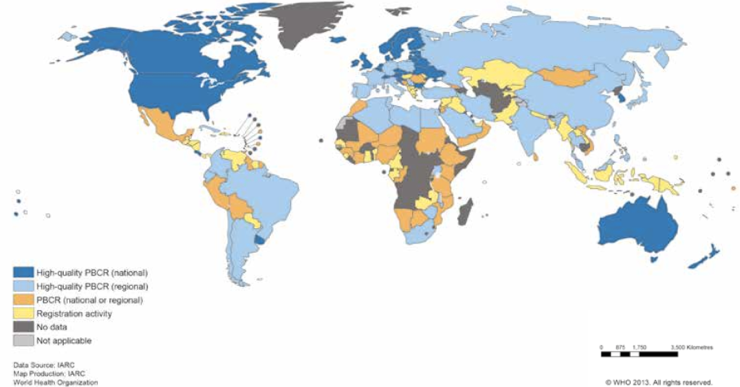Global Key Message
- Registries are at the core of the Global Monitoring Framework on Non-communicable Diseases (NCDs), which includes a commitment to report on cancer incidence and type as an indicator for the global mortality target of reducing premature NCD deaths by 25% by 2025.
- Population-based cancer registries are the best option to measure and understand the cancer burden in the country by providing national estimates (a subset of the national population can be sufficient for ensuring an adequate coverage of a population based registry).
- The establishment of a cancer registry is always possible, even in low-resource settings.
- Improving both the quantity as well as the quality of population-based registries, particularly in LMICs, is critical for ensuring that cancer prevention and control interventions are making progress.
The Facts – Key Data
- National cancer control plans (NCCPs) in all countries must be based on relevant and accurate incidence data to enable governments to develop effective policies for cancer control.
- Through the systematic collection of information on all cases of cancer from multiple sources occurring in a defined geographic area, a population-based cancer registry (PBCR) informs governments of the size and nature of the cancer burden in the country, and the major cancer risk factors.
- A PBCR is a cost-effective investment to assist countries in setting priorities by identifying cancers with the highest burden, planning for emerging trends, focusing research where it is needed and allocating resources where they will make the greatest difference in cancer mortality and morbidity.
- It is also an invaluable tool for the evaluation of cancer control programmes and policies aimed at reducing the cancer burden in the community.
- Worldwide, there are more than 700 cancer registries. However, Only about 21% of the world’s population is covered by population-based cancer registries, with particularly sparse registration coverage in Asia (8% of the total population) and in Africa (11%).

Meeting the Challenge
Launching and maintaining a population-based cancer registry is feasible in all populations, even in low-resource settings. National Cancer Control Plans are key to promote solutions that are tailored to the population size and available resources taking into account some key components:
Target Population: A PBCR does not need to have national coverage to be effective. Most of the requirements for planning and monitoring can be achieved through registration of a well-described subset (sample) from the national population, which has access to diagnostic and treatment services.
Data Availability: There are multiple sources of data for cancer registries including diagnostic reports, hospital records and vital statistics. Selection of the best method for data collection will depend on local circumstances, in particular whether there are pre-existing patient registries with the relevant information on the cancer patient and their diagnosis; as well as the willingness of institutions to share data.
Resources mobilisation: Cancer registration requires dedicated qualified staff. The number of staff will depend on the registry size and the complexity of data collection (how many hospitals, pre-existing registers, etc). Institutional support will be key to ensure the participation of health centers and hospitals providing data to the registry staff.
Country Examples
In order to catalyse efforts to combat cancer, Turkey defined and implemented NCCPs in 2008-2012 and 2013-2018. These processes have informed Turkey’s slogan “Registry is the most important pillar” of our national cancer control program. In less than 15 years, Turkey has made significant progress. In 2002, Turkey only had 2 local registry centers. In 2014, more than 24 registry centers were active with a population coverage of 62%. Now, these efforts are recognized at the international level. The Registry Center of Izmir has been launched in February 2016 as a regional training hub by the International Agency for Research on Cancer (IARC), one of the ICCP Partners.

 CanReg5 Webinar Series (IARC)
CanReg5 Webinar Series (IARC)